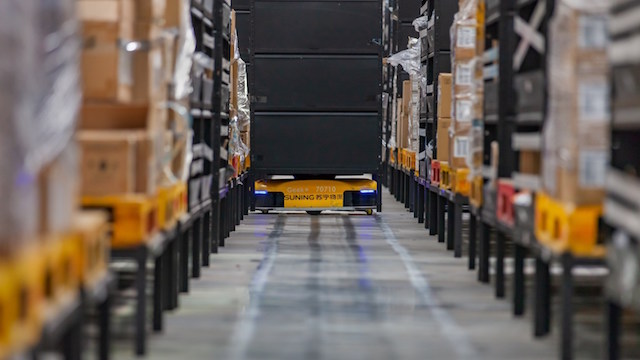Chinese retail giant Suning’s unmanned logistics and contactless delivery services have come to the forefront during the coronavirus outbreak.
The self-isolation of Chinese consumers has resulted in a necessary impetus to develop the services, which the firm believes may accelerate after the epidemic.
According to data released by the firm, the order volume of its convenience stores has increased by 419.6 per cent year-on-year, with food market orders purchased online and picked up in stores surging by more than 655 per cent during the period.
During the epidemic, Suning Logistics launched a “contactless distribution service” with 5G unmanned vehicles. In collaboration with the firm’s convenience stores, unmanned delivery within a 3km radius is guaranteed, reducing the risk of infection between consumer and courier.
The firm’s unmanned systems currently extend from warehouse robots through to driverless trucks and unmanned delivery trolleys or drones at the last mile. The robotic warehouses are managed by a “compass” system whereby – during a 20-minute process – unmanned forklifts use visual navigation technology to load goods for AGV robots, which use intelligent path planning to transport them to a mechanical arm via autonomous navigation and obstacle-avoidance technologies. The robot arm places goods on a conveyor belt through an automatic destacker system, and after machine packaging and labelling, they are sorted for taking out of the warehouse.
The product picking efficiency can reach 600 pieces per hour, with the cost of single product picking reduced by 52 per cent.
Suning’s driverless ground trucks can accurately identify obstacles up to 300m away in high-speed scenarios, and can make emergency stops or bypass obstacles with a response speed of 25 milliseconds. Its fastest speed of automatic safe driving can reach 80km/h. Suning has been developing drone logistics since its first delivery by drone in Anhui province in 2017; the firm has since established three drone delivery routes in the region where it is now part of normal operations.
Additionally, Suning’s new unmanned delivery robot BIU can independently plan routes upon receiving a cargo box with delivery instructions, avoiding obstacles, delivering goods to customers and returning to charge.
According to the Suning Retail Technology Research Institute, it is difficult for the logistics industry to fully launch “unmanned” services in the short term, but the demand for this form of distribution has increased significantly, while consumer acceptance of this type of service has greatly increased. At the same time, as the scope of 5G applications continues to expand, data can be intelligently and prospectively implanted in the mass terminals of logistics operations, enabling them to understand and act independently.
A statement released by the firm concludes that the coronavirus crisis may be the inflection point that brings about an explosion of unmanned technology.






